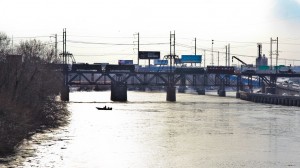Philly mayor backs fee for crude producers, refiners to support rail safety

Kimberly Paynter/WHYY
Seven cars of a 101-car train traveling from Chicago to a refinery in South Philadelphia slid off the tracks on the Schuylkill Arsenal Bridge around 12:30 a.m. Monday.
Five days after a CSX train carrying crude oil derailed on a Philadelphia bridge, crews are still working to clear six cars lying on their side over the Schuylkill River, while officials in major rail hubs want those responsible for the increased traffic on the tracks to pay for safety upgrades.
At a meeting of mayors from around the country, Chicago’s Rahm Emanuel said he wants the federal government to charge a freight fee to crude oil producers and to the industries that consume it. According to a press release from Emanuel’s office in Chicago, Philadelphia Mayor Michael Nutter supports the proposal, along with other measures to step up rail safety.
“This effort will make transportation safer and comply with regulations. The fees will be an account to support rebuilding of America’s aging rail infrastructure to keep our communities safe,” the release said.
A spokesman for Nutter, who was not quoted in the release, declined to comment further about whether the city needs the money to upgrade its rail lines. Earlier this week, Nutter told StateImpact Pennsylvania the city is safe.
The train that derailed in Philadelphia early Monday morning was traveling from Chicago to a refinery on the city’s south side. Once on the verge of closing its doors, the former Sunoco refinery, now known as Philadelphia Energy Solutions, has become the single largest consumer of crude oil from the Bakken Shale in North Dakota. At a ribbon-cutting for the refinery’s new rail yard last fall, CEO Phil Rinaldi said the facility is designed to take up to three loads of crude in hundred-car unit trains each day, if the market complies.
A spokeswoman for the company declined to comment on the mayors’ proposal.
Speaking at an event in Delaware County, Governor Tom Corbett cautioned against any action that might hurt the now-booming refining business in Southeast Pennsylvania.
“Too many times, we have knee-jerk reactions to it,” said Corbett who was pleased that no one was hurt or oil spilled in the incident. “But let’s figure out what needs to be improved, how we need to improve before we automatically say tax more.”
As of Friday afternoon, three of the five derailed tanker cars had been emptied and their contents transferred to upright cars on tracks nearby.
A spokesman for the Federal Rail Administration, which is handling the investigation, said it could take weeks or even months until details on the cause of the derailment are made public.
Corbett said he was told by refinery CEO Phil Rinaldi that the train was traveling on different tracks than usual when the accident happened early Monday morning.
“This is a primary mainline route from the North into Southern Philadelphia that we use regularly for oil and other commodities moving to customers in the area,” said CSX spokeswoman Melanie Cost in an e-mail.
Seven cars, including six oil tankers and a boxcar of sand, went off the rails on a bridge over the Schuylkill River that runs perpendicular to a busy stretch of Route 76 near the University of Pennsylvania campus.
















